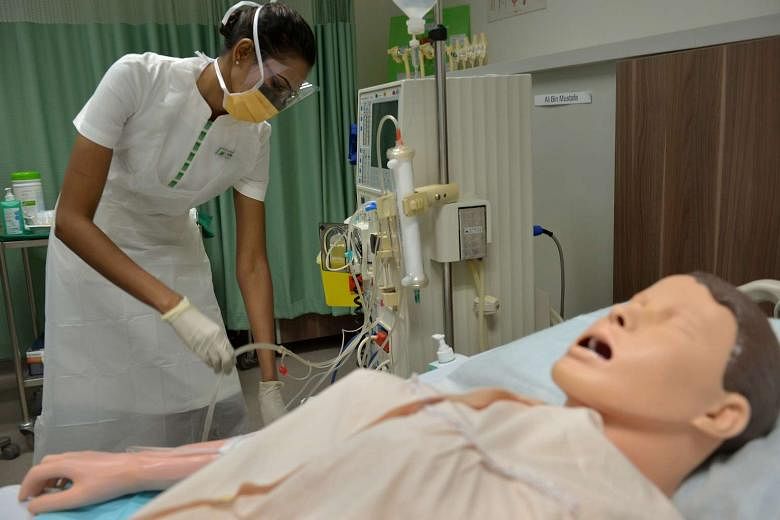New laws could be a way to plug the gaps in the healthcare system revealed by the hepatitis C outbreak, Minister of State for Health Chee Hong Tat said yesterday.
However, Mr Chee stressed that it is too early to provide details as the task force set up to strengthen infection control in all hospitals starts work only early next week.
"The measures that we are going to put in place could also include legislative requirements that would have to be complied with by all healthcare institutions," he said.
"But we just formed the task force, and I think we do need a bit of time to first understand our system (and) see where are the areas for improvement," he added.
-
Who's on the panel
-
The task force is led by Minister of State for Health Chee Hong Tat. Other members are:
• Mr Robert Chew: Managing director of venture capital firm iGlobe Partners, and board member of Alexandra Health System.
• Adjunct Associate Professor Angela Chow: Clinical epidemiology department head at Tan Tock Seng Hospital's (TTSH) Institute of Infectious Diseases and Epidemiology, and adjunct associate professor at Saw Swee Hock School of Public Health at the National University of Singapore.•
• Adjunct Associate Professor Lim Poh Lian: Head and senior consultant of infectious diseases department at TTSH, adjunct associate professor at Saw Swee Hock School of Public Health, and senior consultant at Ministry of Health's (MOH) Communicable Disease Division.
• Mr Ng Chee Khern: Second permanent secretary at MOH, and permanent secretary of defence development at Mindef.
• Associate Professor Benjamin Ong: Director of medical services at MOH.
• Associate Professor Ong Biauw Chi: Chairman of the medical board at Sengkang Health, and clinical associate professor at Yong Loo Lin School of Medicine. She used to be director of clinical governance and patient safety at SGH.
• Ms Sharon Salmon: Assistant director of nursing at National University Hospital. She has a master's degree in public health, and is a trainer and facilitator for the Global Outbreak Alert and Response Network of the World Health Organisation.
He spoke to reporters to give more details of the eight-member task force established to boost the healthcare system's ability to detect and respond to disease outbreaks.
Led by Mr Chee, the task force has experts in infectious diseases, systems engineering and data science. It will likely look at best practices in places like the United States, Britain and Hong Kong, and is expected to complete its work by mid-next year.
Currently, most measures to prevent and control infectious diseases in Singapore come under the Infectious Diseases Act in force since 1977. It includes provisions for the director of medical services of the Ministry of Health (MOH) to get patient information from doctors to investigate an outbreak, and to fine or jail those who lie about donating infected blood, for example.
On Tuesday, the independent review committee (IRC) tasked with investigating the hepatitis C outbreak at the Singapore General Hospital (SGH) concluded that poor infection control practices, and a slow response, were to blame. It also found lapses in the detection and response system for disease outbreaks here.
A total of 25 kidney patients admitted to the affected SGH wards between January and September this year were diagnosed with hepatitis C. Eight have since died.
Yesterday, Mr Chee said that while the task force was formed specifically to implement IRC recommendations, it will look at the healthcare system from a "holistic point of view". "We intend to take the opportunity to see how we can do a thorough systems-level review, and identify where are the areas for improvement, and take concrete steps to address the gaps."
Apart from learning from international best practices, local medical professionals will be asked for feedback on how to enhance the system.
Dr Chia Shi-Lu, who chairs the Government Parliamentary Committee for Health, had previously called for a clearer protocol in detecting and reporting incidents such as the hepatitis C outbreak.
He told The Straits Times last night: "I think the important thing is to have a robust framework for (dealing with) infectious diseases that can be audited and is enforceable.
"Whether or not it needs to be legislated is open for debate."


